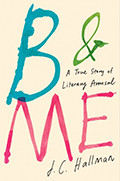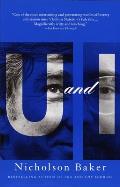
At first, I was dead set against it. I would
not try to meet
Nicholson Baker while I was writing a book about Nicholson Baker. I had a good reason for this. I didn't want to meet Baker because Baker, in
U and I, his fretful, hand-wringing account of his literary relationship with
John Updike, spends a great deal of time trying to meet John Updike. This is peculiar because
U and I is sometimes very critical of Updike, though in general it lauds his work, and why would you set out to meet an author, repeatedly and with only minimal success, when you were also in the process of criticizing him? Indeed, the impulse to meet Updike was one of the very few things I stumbled across in Nicholson Baker's career that sent little bolts of pain through my teeth, and this worried me because what I intended to do, for the most part, was laud Baker's widely known, yet, in my opinion, inadequately heralded, career.
There are other good reasons not to meet authors, too. If you're like me, you've had the experience of falling in love with a writer's voice, their on-page presence, and then encountering them in some way, somewhere, and saying, "Hey, wait a minute! That dude's totally not like what I thought he was going to be like. I need to sit down and completely rethink the hundreds of hours I have devoted to reading him!" And that's unfortunate. Because the whole business of reading, the whole purpose of setting words down on a page instead of blathering them to one another — so that what I'm saying here applies to the entire enterprise of written language — is that there are things about ourselves, our views, our ideals, our weltanschauungs, that we won't or can't utter in live settings, either public or private. In other words, literature — by which I mean not the broader category of storytelling, but text-based storytelling, books — is the most intimate form of human contact we are capable of achieving this side of sex, and it's so close to sex, actually, that for thousands of years people have been saying that reading is like sex, so, to understand why sometimes it might be desirable not to meet an author you've read and enjoyed, all you have to do is reflect on the sex you've had with someone after having fantasized about them, or idealized them, for some time before diving in, as it were. You may very well have enjoyed it, but you also probably discovered that the person was not exactly what you'd imagined, and there may have been cases when the fantasy destroyed the reality. Literature is the fantasy that is potentially disrupted when we meet the fantasy's producer, all of which means, more simply put, that literature should not serve as an introduction to a live human relationship because literature constitutes a relationship in and of itself.
So I decided not to try to meet Nicholson Baker because meeting him would have been redundant — in reading him, I was already meeting him. In fact, I was meeting the better Baker, the Baker who has had a chance to put his mind together, to let his thoughts simmer, reduce, caramelize. And I loved that Baker. I grew righteous in my decision not to seek him out. Any live version of Baker, I came to think, couldn't help but strike me as woefully less than his written self. I refused to settle for a half-baked version of Nicholson Baker.
But then I began to wonder whether I was wrong about all of this. Because I've certainly met authors and enjoyed their off-page presence as much as their on-page presence. By way of contrast, I can't think of an occasion off the top of my head when I encountered, first, an author's off-page presence, and was so inspired by them that I sought out their on-page version. That's not generally how the literary world works. What's far more common is that we read a writer and then follow some kind of impulse to meet them, and very often, early in our reading lives, what we wind up doing is fawning all over the writer as though they're some kind of demigod, and these meetings wind up feeling not particularly intimate or human, though perhaps you come away with a signed book. Why exactly was I against this? Well, for the aforementioned reasons, surely, but also because anything that artificially elevates the writer beyond the simple human being they are, which is presumably one of the reasons their work drew us in in the first place, can't help but undermine the overall goal of literature. You read to have real, intimate, human relations, but then you immediately follow that up with encounters that aren't human and intimate at all. I experienced this once with Joseph Heller, who appeared in Pittsburgh when I was a student there, and whose Catch-22 and God Knows had held me in thrall throughout college. I waited in a long line to meet him, and I think I was probably the only person in the line who didn't have a book for him to sign. (Book signings create disappointing moments too — once, when I reached the front of another line, with a first edition of This Boy's Life, for Tobias Wolff, he asked me who to sign his message to, and, not wanting to be a bother or take up too much of his time, I told him he could just sign it, no need to write a name at all. He glanced at me with scorn — he figured I was just going to sell it — and he quickly signed the book, and shoved it back at me. Mr. Wolff, I still have that book!) But I didn't want to meet Joseph Heller and just have him scribble his name in my much-worn paperbacks. When I got to the front of the line, I asked him a question that I thought would give me some little snippet of his humanity that no one else had. I explained this to him, and then asked what had been the best practical joke he had ever played. He was stumped, of course, and the moment that followed was awkward and disappointing. He couldn't think of anything off the top of his head. And that's my point. When we read writers we don't want the tops of their heads, we want the middles, or the bottoms, but when we seek them out to get books signed or to ask them ridiculous questions the tops of their heads is all we get.
 When I began to doubt this, I reasoned that, outside the context of putting writers on the spot, there might very well be good things on the tops of writers' heads, things that have sautéed a good long time in the saucepans of their brains, and which they are fully prepared to distribute, like a waiter weaving through a party with a platter of hors d'oeuvres. Indeed, one of the other concerns I'd had as a writer and critic was that I thought there was something inherently deceptive about waiting until writers have died to begin critical appraisals of their work. Criticism as a kind of postmortem skirted the possibility that a writer would have something to say, even something delivered spontaneously, in response to whatever was being said about their work. And wasn't the writer actually the best authority to approach on the subject of their work, even if it meant getting top-of-head responses? Wasn't it irresponsible not to seek them out when they were still alive and could add flavor and texture to your own half-baked hypotheses? To find a good example of this, I needed to go no further than Nicholson Baker's U and I, whose subject, Updike, responded to the book in a brief, unsigned review in The New Yorker. Updike called U and I:
When I began to doubt this, I reasoned that, outside the context of putting writers on the spot, there might very well be good things on the tops of writers' heads, things that have sautéed a good long time in the saucepans of their brains, and which they are fully prepared to distribute, like a waiter weaving through a party with a platter of hors d'oeuvres. Indeed, one of the other concerns I'd had as a writer and critic was that I thought there was something inherently deceptive about waiting until writers have died to begin critical appraisals of their work. Criticism as a kind of postmortem skirted the possibility that a writer would have something to say, even something delivered spontaneously, in response to whatever was being said about their work. And wasn't the writer actually the best authority to approach on the subject of their work, even if it meant getting top-of-head responses? Wasn't it irresponsible not to seek them out when they were still alive and could add flavor and texture to your own half-baked hypotheses? To find a good example of this, I needed to go no further than Nicholson Baker's U and I, whose subject, Updike, responded to the book in a brief, unsigned review in The New Yorker. Updike called U and I:
a close and self-pitiless examination of [Baker's] relationship with a mental figment derived from a fractional perusal and a few personal glimpses of the author John Updike.
Quite right. On the one hand, I could happily note that my own concerns about "personal glimpses" replacing the real figure of the author had been seconded by the man Baker himself had called "the model of the twentieth-century man of letters." On the other hand, it was only because Baker had sought out Updike repeatedly that Updike, a still-living author, had been able to respond in a way that seemed to support my concerns. I really had no other choice than to conclude that there were good arguments on either side: it is both desirable and not desirable to meet authors you admire.
In the end, I decided to go ahead and meet Nicholson Baker, basically because I believed it was unfair to write a book about him without giving him the opportunity to become more than a "mental figment." I was terribly nervous about meeting him, because what if his off-page presence destroyed his books, and, thereby, my book? But that did not happen. Nicholson Baker is a kind off-page presence, and my experience of him affirmed rather than threatened all the things I was saying about him. As we chatted, Baker spoke very slowly, as though attempting to give his thoughts a quick toasting before letting them out into the world. He was of course wondering whether I would quote him. And I did, just a bit. Regardless, it was wonderful to have met the author whose work had come to mean so much to me, and if you ever have the chance I suggest you try to meet him too. Which isn't to say that meeting authors doesn't have its downside. Meeting an author like Nicholson Baker, whose thoughts in print are never half-baked, is like watching a master chef cook you dinner using only a blowtorch or microwave oven. You'll enjoy the company, and you might even like the food, but meeting authors should never be confused with or replace the more profound experience of leaving them alone in the kitchen until the oven timer dings and dinner is served.